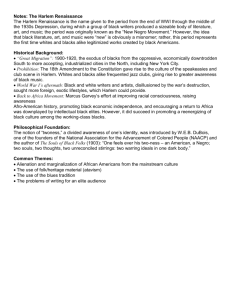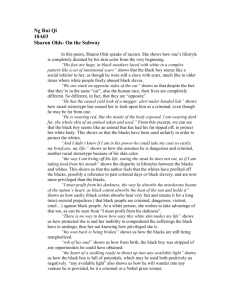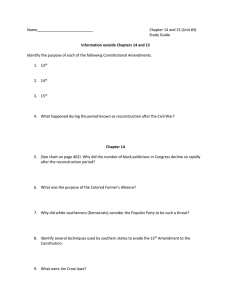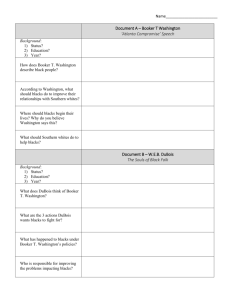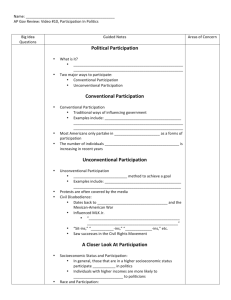perspectives in literature november 26, 2007
advertisement
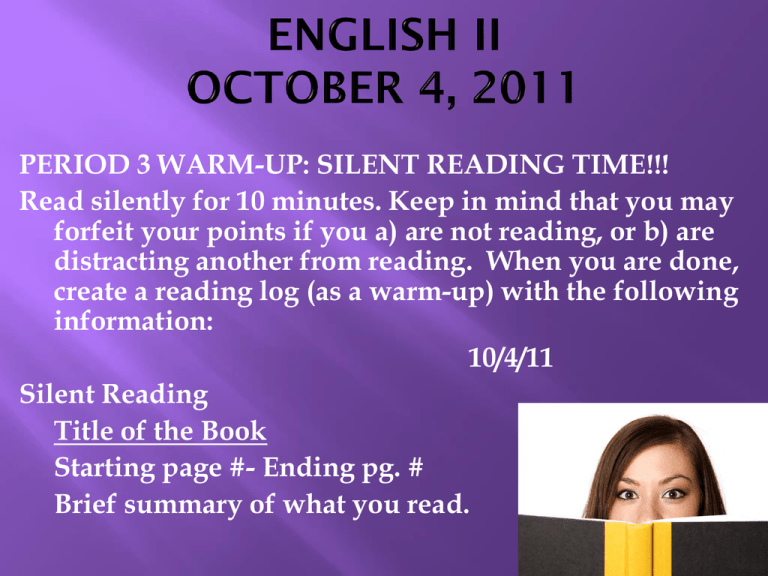
PERIOD 3 WARM-UP: SILENT READING TIME!!! Read silently for 10 minutes. Keep in mind that you may forfeit your points if you a) are not reading, or b) are distracting another from reading. When you are done, create a reading log (as a warm-up) with the following information: 10/4/11 Silent Reading Title of the Book Starting page #- Ending pg. # Brief summary of what you read. Bring Black Boy from here on out. We will finish taking notes on Black Boy History in a moment. Keep all notes for this class in a separate section. Anybody who still needs Black Boy? Portfolio pieces from non-English classes are due on Thursday, October 20th Speak to any teachers who have not given you a portfolio assignment yet. Literary Response and Analysis 3.12: Analyze the way in which a work of literature is related to the themes and issues of its historical period. (Historical approach) 1917: U.S. enters World War I; more than 200,000 black soldiers serve. At war, blacks are treated much better in Europe. (Britain abolished slavery 40 years before the U.S.) Some Blacks choose to stay in Europe; others come back to U.S. after experiencing better treatment. They want to know why serving their country doesn’t earn equal treatment. 1917: War and cotton crop failures start a “Great Migration” of blacks to the urban North. Richard’s family is affected by this. 1919: Jamaican-American poet Claude McKay writes a poem that tells blacks to take control of their lives and speak out. A black literature movement began called The Harlem Renaissance novelists, poets and essayists wrote about the black experience. expressed racial pride AND outrage at social injustices. If we must die, let it not be like hogs Hunted and penned in an inglorious spot, While round us bark the mad and hungry dogs, Making their mock at our accursed lot. If we must die, O let us nobly die So that our precious blood may not be shed In vain; then even the monsters we defy Shall be constrained to honor us though dead! O kinsmen! We must meet the common foe! Though far outnumbered let us show us brave, And for their thousand blows deal one death blow! What though before us lies the open grave? Like men we’ll face the murderous, cowardly pack, Pressed to the wall, dying, but fighting back! Source: Claude McKay, “If We Must Die,” in Harlem Shadows: The Poems of Claude McKay (New York: Harcourt, Brace and Co., 1922). Goals of H.R.: voice pride in heritage use writing to fight social injustice. 1929: the Harlem Renaissance ends as Black writers can no longer make money on their work. Influenced by the Harlem Renaissance, Richard Wright begins his own writing. “I wanted to build a bridge of words between me and the world outside, the world which was so distant and elusive that it seemed unreal.” (Wright 384). “Jim Crow” = laws and manners that mandated segregation in the American South from 1877-1960. “Minstrels Shows” were spectacles created by Whites, for Whites to mock and laugh at representations of Blacks. Blacks were represented by whites as singing, dancing, grinning fools. The stereotype included the ideas that blacks were lazy, stupid, uncivilized and unworthy of integration. (Why was this stereotype created?) Jim Crow laws, which oppressed blacks, were wrongly justified by such stereotypes. Jim Crow laws took away rights of blacks. People who supported these laws believed blacks were inferior to whites the two races should be kept separate. Blacks were not supposed to… …hint that a white person was lying. …demonstrate superior intelligence. …cuss at whites …laugh at whites …comment on the appearance of white females (males). Blacks could vote, if they could prove that they did not break the following rules/regulations: Grandfather clauses: you couldn’t vote unless your ancestors before the Civil War could. European-American Primaries: Only Democrats could vote and only EuropeanAmericans could be democrats. Literacy Tests: you could only vote if you passed a test that revealed your ability to read and write. Poll Taxes: fees charged to poor Blacks. Why are these rules unfair? Early abolitionists first questioned racism through photography that showed how similar blacks and whites could be. Blacks worked hard and made progress through the court system due to lawyers like Thurgood Marshall of the NAACP. Late 50’s and early 60’s: people of different races stand up to end segregation. Cool-down: Now that you understand more about the historical setting of Black Boy, answer the following: 1. Explain at least one value that was challenged but that would have been worth fighting for during this time period. 2. What are some of ways that you would fight for this value?
